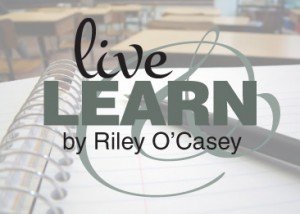I n Prince William County, teachers are evaluated every three years with several informal, or pop-in, observations every year. It’s always a little stressful when you are observed. Will you say the right things? Will you remember everything in your lesson plan? Will your students behave? These questions, and so many more, go through a teacher’s mind prior to an observation.
n Prince William County, teachers are evaluated every three years with several informal, or pop-in, observations every year. It’s always a little stressful when you are observed. Will you say the right things? Will you remember everything in your lesson plan? Will your students behave? These questions, and so many more, go through a teacher’s mind prior to an observation.
Don’t get me wrong – all teachers should be held accountable. I don’t think any teacher would argue that fact. They also need the important dialogue with their administrators after the observation in order to understand their strengths and weaknesses and what they can do to grow. Unfortunately, our elected officials are making teacher evaluation and the process more and more difficult for teachers.
The passing of the federal government’s No Child Left Behind (NCLB) Act was ultimately the beginning of the end for any respect towards public education and teachers. I know this statement sounds a little dramatic, but legislators, not educators, created this act; legislators who know very little about public education. Through NCLB, all public schools administer state-wide standardized tests. Standardized tests, unfortunately, have taken the fun and creativity away from teaching. If a school repeatedly receives poor scores, the government steps in to improve the school. What the government seems to not understand is that while there are “bad teachers,” 99 percent of America’s teachers give 150 percent to their students. Public education cannot control what happens to students outside of the classroom. There are so many variables impacting children and these variables enter the classroom every day.
While NCLB has added stress to a teacher’s job, the Virginia government has added more. Teacher evaluation has recently changed in Virginia. Teachers are now evaluated based on standards. Standards 1 – 6 are reasonable standards. It’s Standard 7 that has teachers very concerned – Student Academic Progress. Yes, teachers are now evaluated on the progress their students make. In theory, this makes sense as teachers are in the business of teaching children. What our legislators don’t seem to understand is that there are myriad of variables that impact a child’s learning and 95 percent of these are uncontrolled by teachers. Teachers cannot follow their students home to make sure they study or make it to school every day. We cannot tell parents to make sure their children eat breakfast and come to school prepared. Yet 40 percent of our evaluation is based on many factors we cannot control.
Prince William County Schools has been a forerunner of the new teacher evaluation. More than five years ago, they began the development of the PPP (Professional Performance Process). The PPP emphasizes ongoing dialogue between teachers and administrators, as well as continuous observation and growth-producing feedback. These factors are designed to impact student learning. Teachers are creatures of habit, and this new evaluation process has been difficult to accept. The Prince William Education Association has held 12 information workshops with the goal of educating our members about the PPP. The school division has just started a PPP seminar series this year with the same goal in mind.
In the eyes of many educators, the state's new teacher evaluation has made teaching more difficult. My ongoing thoughts focus on the impact on teachers and students. The sad fact is that most teachers now “teach to the test.” For example, this year, a parent who is an attorney offered to come in and talk to my students during our Judicial System Unit. They would have benefited greatly from this opportunity; however, I just could not give up the time to teach the required objectives. What worries me the most, though, is the impact on my students. The pressure the state puts on school divisions trickle down to administrators and teachers and ends with the students. This is not an action that is planned or created on purpose; however, it is something that has become the norm in public education. My 8th grade students take five SOL tests at the end of the year. Add that to that the traditional testing throughout the year (approximately 10-12 tests per core class equals 60 – 70 tests), and no wonder school and testing anxiety have increased over the years.
A multiple choice test is NOT the only indicator that shows a student is learning, or that a teacher is successful in the classroom. My hope for the future of public education is that all legislators would understand student assessment and teacher evaluation and make the appropriate changes to ensure that ALL students AND teachers succeed. What if we based the evaluation and paychecks of our legislators on their performance? I bet they might reconsider their ideas for public education.
Riley O’Casey is a local educator who teaches middle school social studies. She is also an active member of the Prince William County Education Association.
This column is an opinion piece, and does not necessarily reflect the views of Bristow Beat, its editors, writers or sponsors.
Support Bristow Beat - Donate Today!